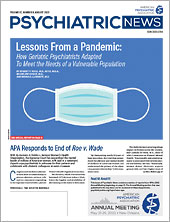I agree with all the observations made by many of my colleagues: Many girls and women, with the likely overrepresentation of our patients, will be grievously harmed by the Supreme Court’s decision in Dobbs v. Jackson Women’s Health Organization and its application across the country. Psychiatric expertise has been misrepresented in anti-abortion laws; abortion does not cause psychiatric illness. There is no evidence that mandated parental involvement improves the outcomes of pregnant underage girls. It makes no sense to place barriers to abortion on the basis of youthful decision-making when the only other outcome—having a baby—will accord them full legal responsibility for the care of a helpless infant.
The sanctity of the doctor-patient relationship has already been trampled by laws, unique to abortion, mandating specific, inaccurate language for abortion providers to use with patients. We are obligated to study the impact of forced pregnancy and delivery and to provide support for women who undergo them. Fetal personhood, a concept already embodied in state legislation, reduces women to secondary citizenship, with the life of a conceptus or embryo valued over the life of a woman.
Let me add some complementary observations. Abortions have occurred everywhere and at every time in history. They are least common where they are safe, legal, and accessible. Abortions happen because there are many barriers and complications to the universal use of contraception—access to which has already been limited by previous Supreme Court rulings. Abortions happen because women insist, to the point of risking pain and death, on having children when they feel they can provide proper care for them. Therefore, abortion is a crucial issue not only for women, but for families and society at large. Already, in Catholic hospitals, women with incomplete spontaneous miscarriages, nonviable fetuses, and ectopic pregnancies are forced to suffer sepsis and hemorrhage for want of medical care because the institution or physician believes that the fetus, which has no chance of survival, is still alive. Where abortion is illegal, doctors, including psychiatrists, may be forbidden to discuss or recommend it. Outlawing abortions by use of medication, already deemed by the American College of Obstetricians and Gynecologists as safe for use at home, will loose state investigators and ordinary citizens to pry into women’s intimate behavior, as will laws, which already exist, to punish pregnant women whose behavior is deemed unhealthy for the fetus. Remember that, in the United States of America, it is illegal to invade an adult’s body even to obtain a drop of blood which might save another person’s life. I hear from practitioners and teachers of obstetrics and gynecology that many medical students will refuse to train in “outlaw” states and that locum tenens companies cannot find obstetricians to work in such states. It is terrifying to treat patients where the state may monitor and intrude upon medical decisions and sentence physicians for murder. Millions of already underserved women will be unable to obtain obstetrical care.
What does all this mean for the practicing psychiatric clinician? Over a quarter of the women in the United States will have an abortion during their lives—likely more among our patients, who may not feel able to deal with pregnancy at times as they cope with depression, mania, anxiety, and psychosis. We owe all of our patients accurate information about the psychiatric aspects of abortion. Many of our patients, wherever they live, will be reacting to the Supreme Court decision with anger, frustration, and fear. We understand how they feel. We can help them strategize about incorporating the new reality into their feelings and behavior. Those of us who practice in states or institutions where discussion of abortion is forbidden will have to decide whether the responsibility for patient welfare requires them to break those rules. We may need to provide special services for girls and women in particularly painful situations—very young girls who are physically and mentally unprepared to become mothers, victims of rape and incest, and women forced to carry fetuses with significant genetic or other anomalies—and patients forced to go to extraordinary lengths, perhaps facing prosecution, to obtain abortions. Many of these individuals, tragically, live in areas or under circumstances where psychiatric care is already difficult to obtain. As I write, this is happening.
We will certainly encounter patients who are convinced that they and their loved ones will never need or want abortion services. It is important to note that members of religions opposed to abortion have abortions at the same rate as those in permissive religions or without religious affiliations. As with other moral prohibitions, there are times when a person feels it necessary to ignore those prohibitions while continuing to endorse them in theory and even to disparage others who violate them as they have done. Untenable pregnancies occur, almost by definition, under circumstances a woman does not anticipate. (This is probably one of the reasons that, while most people in America support abortion access, they vote for lawmakers who don’t.) Overall, when our patients are in the midst of making decisions about pregnancies, we help them think through their own values and circumstances.
I know there are psychiatrists who are opposed to abortion, and their moral opposition deserves respect. However, they need to remember that ethical practice requires that they refer patients who are grappling with the difficult decision to have an abortion or that they do not impose their own beliefs on patients and treat the patient with neutrality.
As a psychiatrist, I believe we should urge every patient who could become pregnant to have emergency contraception and abortion medications in their possession, prescribed by us, if necessary. Their most basic autonomy, their lives, and their families are at stake. Psychiatric care requires respecting the values, decisions, and needs of our patients. ■

